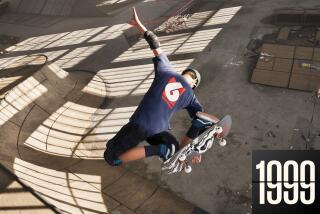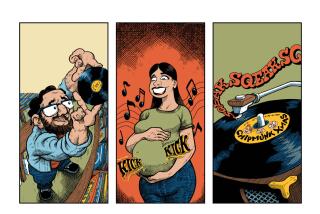DVDs brighten the picture
- Share via
Video killed the radio star, but it may save the music business. Again.
As anyone entering music stores in this height of the holiday shopping season can plainly see, an explosion in the music DVD market is having a tremendous impact -- maybe enough to make the difference between a good sales year and a bad one.
“We’re projecting it to be 5% to 6% of the total market, which is getting to be a significant number,” says Jim Urie, president of Universal Music & Video Distribution.
Led by new packages such as the Live Aid concert and an interactive Britney Spears collection, a surge in music DVD buying is expected through Christmas, capping a year that has already seen the market nearly double last year’s sales. In 2003, Nielsen SoundScan reported U.S. music DVD sales at just shy of 13 million. Through Nov. 21, the 2004 figure was already more than 24 million.
The year’s biggest seller so far is Linkin Park’s “Live in Texas,” at more than 400,000 copies. That’s the same number “Live In Texas” sold in 2003, when it finished third overall behind 50 Cent’s “The New Breed” and a four-disc Led Zeppelin live collection.
The growth is being fueled by two factors. On one hand is demand, with more and more consumers acquiring high-end home theater equipment and looking for material.
“Reportedly 19% of homes now have home theater systems,” Urie says. “That’s the big driver of this market.”
That means that new artists with just one or two music CD releases can viably enter the DVD market. British pop-jazz newcomer Jamie Cullum, for example, has just released a concert DVD despite having only one album under his belt.
“It’s really a piece for the fans,” says Bob Bell, DVD product manager for the Virgin Megastores chain. “Even if someone doesn’t have a huge catalog, there are fans who want to see live performances and behind-the-scenes features.”
And then there’s the increased quality of the product being released.
“We’ve gotten better at doing it,” Urie says. “The content is better, special features are better and the pricing is getting better.”
In recent years, a simple collection of music videos by an artist would likely have cost $30. Now most single-disc DVD releases are being priced at less than $20 -- some much less. Meanwhile, reduced costs in production and manufacturing mean that even independent artists can more readily join the DVD parade.
“As the mastering prices have come down and the actual costs to assemble a DVD have lowered, and also the expertise has grown, many independent labels are doing it in-house, so as a result you’re seeing many more titles emerge,” says Andy Allen, president of the Alternative Distribution Alliance, which distributes many independent labels.
Another attraction to the distribution and retail networks: Video is more difficult to download than music, legally or otherwise. So while such authorized services as Apple’s iTunes and various unauthorized peer-to-peer services have cut into record store traffic, DVD business is filling the gap.
“It’s definitely a product line less likely to be downloaded, bootlegged or burned, so that makes it appealing,” says Bell.
And the future looks just as bright, with growth expected to continue at the same rate in 2005 as major retailers get more solidly behind music DVDs. Best Buy music business team leader Lon Lindeland notes that the chain just recently moved music DVDs from the movies section of the stores to the music section in order to give them more prominence. And Urie reports that Wal-Mart, the nation’s largest retail force, is making music DVDs one of its growth priorities for the new year.
“Once you get the Wal-Marts interested, you’ve reached the masses,” says Urie. “Next year’s going to be even bigger.”
A soundtrack that’s criminal
We’ve just gotten used to the idea of soundtrack albums spawned by video games, but here comes one that breaks the still-fresh mold: an eight-CD collection tied to the “Grand Theft Auto” game. The set, being released Tuesday by Interscope Records, plays off an option of the game in which there are eight radio stations users can play in the stolen automobiles. The game is set in the early ‘90s, so the programs highlight sounds from that time, including hip-hop, alternative rock and reggae.
But will this music sell, especially with a list price of more than $50?
“We think it’s a great item and we’re comfortable with whatever it ends up with in sales,” says Steve Berman, Interscope’s head of marketing and sales.
The company has also released a two-CD highlights version that comes with a bonus DVD featuring a 20-minute extension of the game experience, and has established an ongoing relationship with “Grand Theft Auto” producer Rockstar Games -- which is the real impetus behind the larger set.
“The Rockstar guys are so incredible in what they do,” Berman says. “They have an incredible sense of their audience and how to speak to that audience. We were proposed this idea and we’re betting on these guys.”
U.S. as filtered by a German prism
In what seems to be a time of increased sensitivity to what is broadcast on radio and TV, even foreign languages aren’t immune. While a song by the rock band Rammstein singing in its native German would seem to be fairly safe, a Texas radio station found that the track “Amerika,” from the new “Reise Reise” album, got a lot of listener complaints recently. It so happens that the station is near Ft. Hood, home to many military personnel who have spent time in Germany, as well as being in a region that is home to many German immigrants.
The song is critical of the global impact of American pop culture, with satirical lyrics that refer to Mickey Mouse, Coca-Cola and the Wonderbra. And when KLFX-FM in the town of Killeen started playing it, the phones started ringing.
“A lot of GIs here speak German,” says program director Bob Fonda, who spent four years in Germany with the military. “The immediate response was that it was just not American. But other people thought it was pro-American.”
The station took the debate to the air, inviting listeners to express their opinions. And despite the negative reactions some expressed, the song is still being played, though in a lighter rotation.
“We’re still playing the record,” Fonda says. “We still play several of their records, but this really has that social edge to it. It’s a sensitive time in America.”
More to Read
The biggest entertainment stories
Get our big stories about Hollywood, film, television, music, arts, culture and more right in your inbox as soon as they publish.
You may occasionally receive promotional content from the Los Angeles Times.










